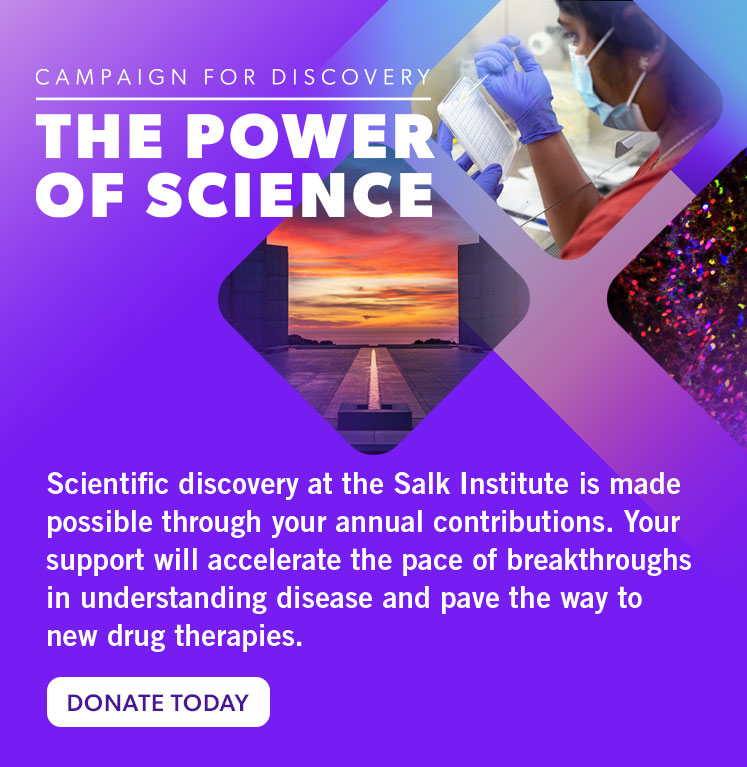In the News We are grateful to our many generous donors
NOMIS Foundation’s $20 million gift helps Salk launch Neuroimmunology Initiative

The Salk Institute will receive $20 million over four years from the NOMIS Foundation to launch a new Neuroimmunology Initiative within the Institute’s NOMIS Center for Immunobiology and Microbial Pathogenesis. By funding research programs, faculty recruitment, and pilot grants, the generous gift will enable Salk scientists to develop a deep understanding of the crosstalk between the immune and nervous systems and the role it plays in health and disease.
“We are deeply grateful to the NOMIS Foundation for investing in neuroimmunology and in Salk,” says Salk President Gerald Joyce. “This funding will allow us to tackle currently unaddressed scientific questions, opening fundamentally new areas of scientific inquiry across human health and disease and paving the way toward innovative therapeutic interventions for a wide range of disorders that have both a neurological and immunological component, such as Alzheimer’s disease, ALS, long COVID, and some forms of cancer.”
The Neuroimmunology Initiative encompasses two interconnected research programs: 1) Body to Brain, which will explore how the immune system and inflammation affect the nervous system, and 2) Brain to Body, which will investigate how the nervous system modulates immune responses throughout the body.
The Neuroimmunology Initiative will be co-led by Professor Susan Kaech, an immunologist, director of Salk’s NOMIS Center, and NOMIS Chair, and Associate Professor Nicola Allen, a neuroscientist. They will work with Professor Axel Nimmerjahn and Associate Professor Diana Hargreaves to guide the Neuroimmunology Initiative’s research aims. The team will also recruit a new cross-disciplinary faculty member and offer pilot grants to allow a broader range of Salk scientists to explore intersections between their current work and the Initiative’s aims and to infuse their research programs with additional expertise and cutting-edge technologies.
As part of this new Initiative, a Neuroimmunology Symposium will be held within the next year, where Salk and other leaders in the neuroimmunology field will be able to share ideas, seek feedback, and build new collaborations in this space.
“We are excited to take a deep dive into the understudied intersection of neuroscience and immunology,” Kaech says. “This work is important because growing evidence indicates that inflammation is linked to neurodegeneration in aging, and a person’s brain function and mental state can be affected by immune responses. Yet we don’t fully understand the bilingual communication between cells in our immune system and our nervous system—a language we commonly refer to as neuroimmune crosstalk.”
“We are keen to determine how peripheral inflammation is sensed and interpreted in the central nervous system and the impact that inflammation has on brain function and behavior,” Allen says.
The NOMIS Foundation has been a valued partner of the Salk Institute for many years. The foundation’s previous gifts led to the creation of Salk’s NOMIS Center in 2008 and subsequently funded several research projects, supported postdoctoral trainees, and enabled faculty recruitment. These resources have sustained and expanded the impact of Salk’s research on immunity and inflammation, and the new donation will further enhance NOMIS’ global reputation for creativity and innovation.
“As a new frontier of biological sciences is emerging at the intersection of immunology and neuroscience, we welcome that Sue Kaech and her colleagues at the NOMIS Center at Salk aim to capitalize on this momentum by launching this Neuroimmunology Initiative,” says Markus Reinhard, managing director of the NOMIS Foundation and vice chair of Salk’s Board of Trustees. “In this area, the researchers will gain a much better appreciation of critical intercommunication between the immune and nervous systems and how it plays a role in health and disease. Salk’s robust foundation in neuroscience and immunology presents a fertile ground for pioneering, fundamental discoveries in mental health, behavior, aging, and chronic diseases that span pathogen-induced conditions, neurodegeneration, and cancer. At NOMIS, we are glad to support world-leading researchers striving for new insights and future advancements in our understanding of fundamental conditions and interdependencies of health and disease.”
Paul M. Angell Foundation’s $5 million gift will help spur new pancreatic cancer diagnostics and therapies

The Salk Institute will receive $5 million over four years from the Paul M. Angell Family Foundation to support pancreatic cancer research. The project’s leaders, Salk Assistant Professor Dannielle Engle, Professor Ronald Evans, and Professor Reuben Shaw, are establishing a novel pipeline from patients to the laboratory and back to the clinic. The approach will provide a unique opportunity to uncover new diagnostics and therapies for pancreatic cancer.
Pancreatic cancer is one of the most devastating cancers, in part because it is so difficult to diagnose. The condition is generally asymptomatic until the later stages of the disease, and by then, for most patients, it is too late to intervene. Pancreatic cancer is also notoriously resistant to therapy, partly because the tumors grow encased in a thick layer of protective tissue.
The generous gift from the Paul M. Angell Family Foundation will enable Salk scientists to analyze patient tumor samples in the laboratory, construct corresponding pancreatic tumor organoids, and screen compounds—potential drug precursors—to find those that block tumor growth and progression.
Pancreatic organoids are patient-specific miniature pancreases that provide a realistic representation of functioning human pancreases. They allow scientists to analyze a patient’s tumor as well as its microenvironment of cells and surrounding tissues. One example compound that will be tested on these organoids is an activator of the vitamin D receptor, which has been shown to prevent the formation of fibrotic tissue shells around pancreatic tumors. These findings will be shared back to the clinic, where the researchers aim to provide personalized therapeutics.
Wicklow Foundation gives $2 million to establish Margaret Faye Wilson Endowment
The Wicklow Foundation donated $2 million to the Salk Institute to establish the Margaret Faye Wilson Endowment in honor of the banking and retail leader and former Salk Trustee. Wilson served on the Salk Board from 2010 to 2019 and was a generous supporter of the Institute’s research over the years. A treasured member of the community, Wilson died in July 2023.
The new endowment will support Salk’s chief information officer and the Institute’s biocomputation strategy. With new investments in biocomputation—advanced capabilities in computing, data storage, machine learning, and artificial intelligence—the Institute is working to better position Salk researchers to acquire high-throughput data and harness varied datasets. The Wicklow Foundation’s investment will empower researchers to tackle currently unaddressed scientific questions and open fundamentally new areas of inquiry across fields ranging from cancer to climate change.

Prebys Foundation awards $1 million to support Salk’s research and diversity efforts
As part of its $7 million “Prebys Research Heroes” program, the Prebys Foundation awarded Salk Professor Tatyana Sharpee and Assistant Professor Dannielle Engle each $500,000 to fund their research. The grants will be dispensed over two years and are part of 14 grants the foundation awarded to support women pursuing research careers in San Diego.
Sharpee uses advanced computational approaches to unravel how the brain works. Engle investigates new approaches to the diagnosis and treatment of pancreatic cancer. Both researchers have committed to allocating part of their funds to the Salk Summer Undergraduate Research Fellowship (SURF) and Salk’s Heithoff-Brody High School Summer Scholars program, which aim to inspire the next generation of scientists from diverse backgrounds.
“I am grateful to the Prebys Foundation for selecting me as a recipient of this generous award. This support comes at a critical time for my group. It will allow us to build a convincing case of the main principles according to which the brain works and how brain aging can be slowed.”
–Professor Tatyana Sharpee
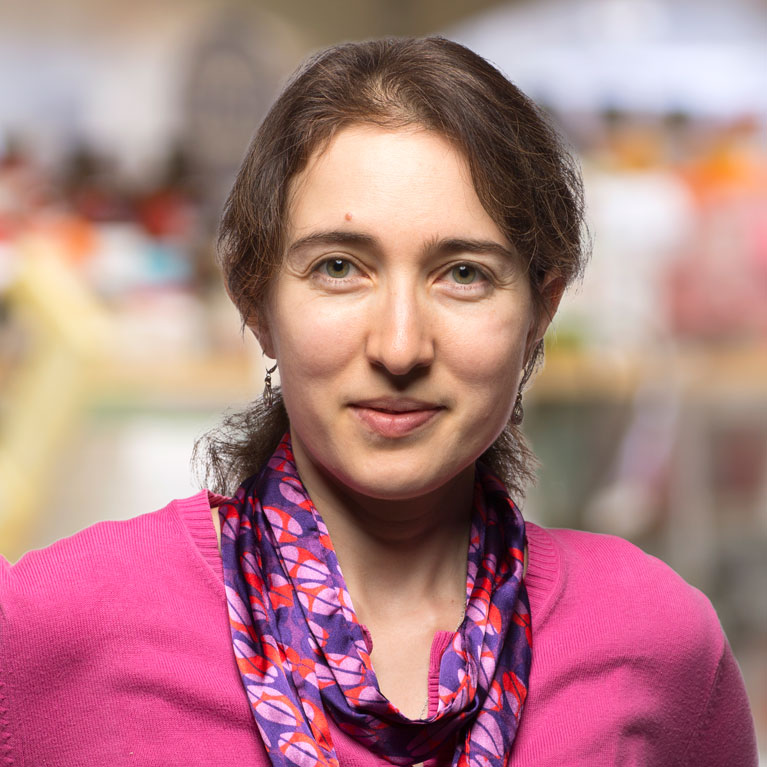
Featured Stories
 Getting to the root of Alzheimer’sSalk scientists are teaming up to understand brain aging. By collaborating across disciplines like genetics, neuroscience, and immunology, our researchers are uniquely positioned to lead us into a future of healthier aging and effective therapeutics for Alzheimer’s.
Getting to the root of Alzheimer’sSalk scientists are teaming up to understand brain aging. By collaborating across disciplines like genetics, neuroscience, and immunology, our researchers are uniquely positioned to lead us into a future of healthier aging and effective therapeutics for Alzheimer’s.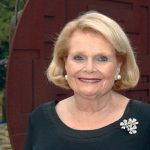 Salk mourns the loss of Joan JacobsThe Salk Institute lost one of its greatest supporters and one of San Diego’s most generous philanthropists when Joan Jacobs died on May 6, 2024, in La Jolla, California. She was 91 years old.
Salk mourns the loss of Joan JacobsThe Salk Institute lost one of its greatest supporters and one of San Diego’s most generous philanthropists when Joan Jacobs died on May 6, 2024, in La Jolla, California. She was 91 years old.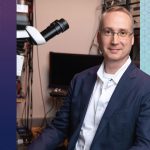 Axel Nimmerjahn— Widening perspectives through plane windows and microscope lensesInside Salk sat down with Nimmerjahn to hear how he went from curious child to world renowned researcher. Now a professor at Salk, he studies the central nervous system and designs new tools—like mini microscopes!—to study the system's various cell types.
Axel Nimmerjahn— Widening perspectives through plane windows and microscope lensesInside Salk sat down with Nimmerjahn to hear how he went from curious child to world renowned researcher. Now a professor at Salk, he studies the central nervous system and designs new tools—like mini microscopes!—to study the system's various cell types. Jálin Johnson— Enhancing equity and inclusion at Salk and beyondOver the course of nearly 30 years dedicated to advocacy work, Jálin B. Johnson has served those in need and has given a voice to the voiceless—a principle that has guided her throughout her career. This commitment continues to shape her work as she steps into the role of director of Salk’s Office of Equity & Inclusion.
Jálin Johnson— Enhancing equity and inclusion at Salk and beyondOver the course of nearly 30 years dedicated to advocacy work, Jálin B. Johnson has served those in need and has given a voice to the voiceless—a principle that has guided her throughout her career. This commitment continues to shape her work as she steps into the role of director of Salk’s Office of Equity & Inclusion.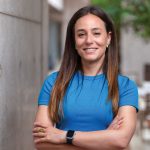 Lara Labarta-Bajo—An immunologist’s journey from Barcelona and ballet to the brainWhether dancing in Spain or surfing in San Diego, Lara Labarta-Bajo has always celebrated the power of the human body. Now a postdoctoral researcher in Associate Professor Nicola Allen’s lab at Salk, she studies how the immune system connects the body to the brain and how this relationship evolves as we age.
Lara Labarta-Bajo—An immunologist’s journey from Barcelona and ballet to the brainWhether dancing in Spain or surfing in San Diego, Lara Labarta-Bajo has always celebrated the power of the human body. Now a postdoctoral researcher in Associate Professor Nicola Allen’s lab at Salk, she studies how the immune system connects the body to the brain and how this relationship evolves as we age. Professor or partner? Luc Jansen’s switch from science to lawDashed dreams of medical school brought Jansen to Salk's campus back in 2003, where he simultaneously contemplated a career in scientific research and a career in big law. Though he decided on law in the end, Jansen's affection for Salk remains as he now hosts Salk gatherings in his New York City office and excitedly shares the enduring importance of basic science.
Professor or partner? Luc Jansen’s switch from science to lawDashed dreams of medical school brought Jansen to Salk's campus back in 2003, where he simultaneously contemplated a career in scientific research and a career in big law. Though he decided on law in the end, Jansen's affection for Salk remains as he now hosts Salk gatherings in his New York City office and excitedly shares the enduring importance of basic science.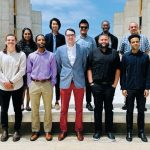 Rising Stars and DISCOVER programs provide new opportunities for trainees from underserved backgroundsThe Salk Institute recently hosted two inaugural events designed to enhance diversity within the scientific community: the Rising Stars Symposium and the Diverse Inclusive Scientific Community Offering a Vision for an Ecosystem Reimagined (DISCOVER) Symposium.
Rising Stars and DISCOVER programs provide new opportunities for trainees from underserved backgroundsThe Salk Institute recently hosted two inaugural events designed to enhance diversity within the scientific community: the Rising Stars Symposium and the Diverse Inclusive Scientific Community Offering a Vision for an Ecosystem Reimagined (DISCOVER) Symposium.






















































